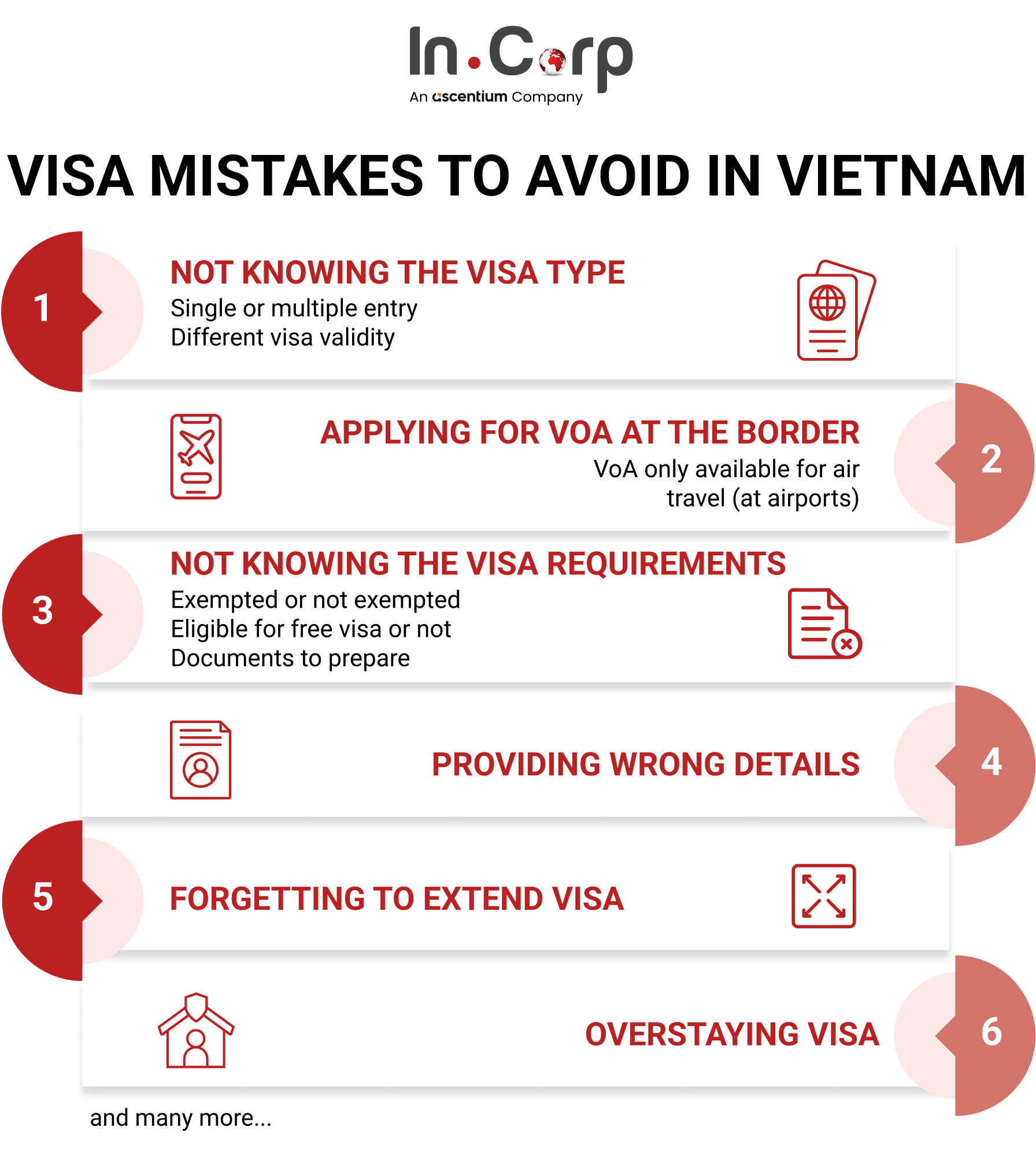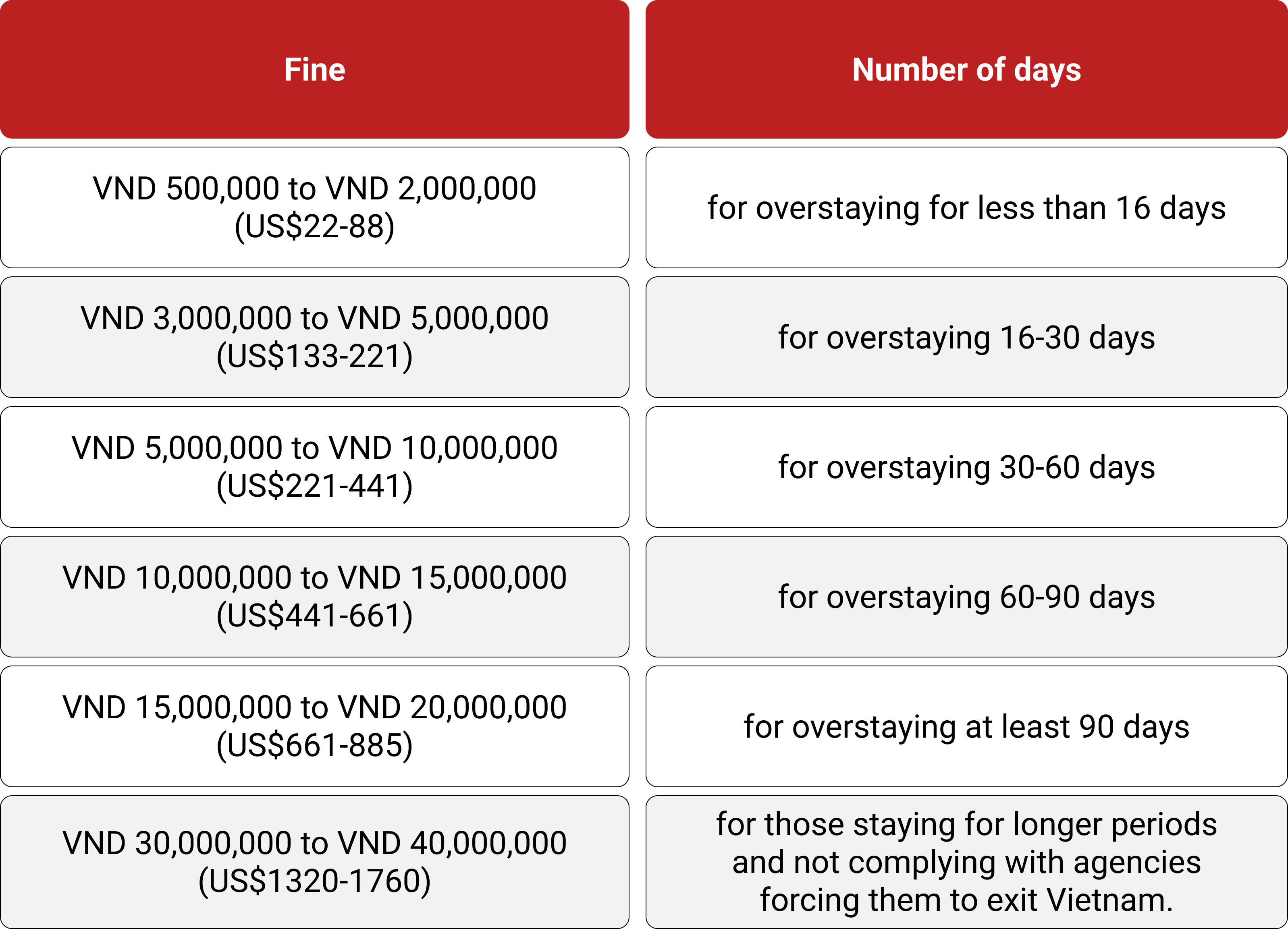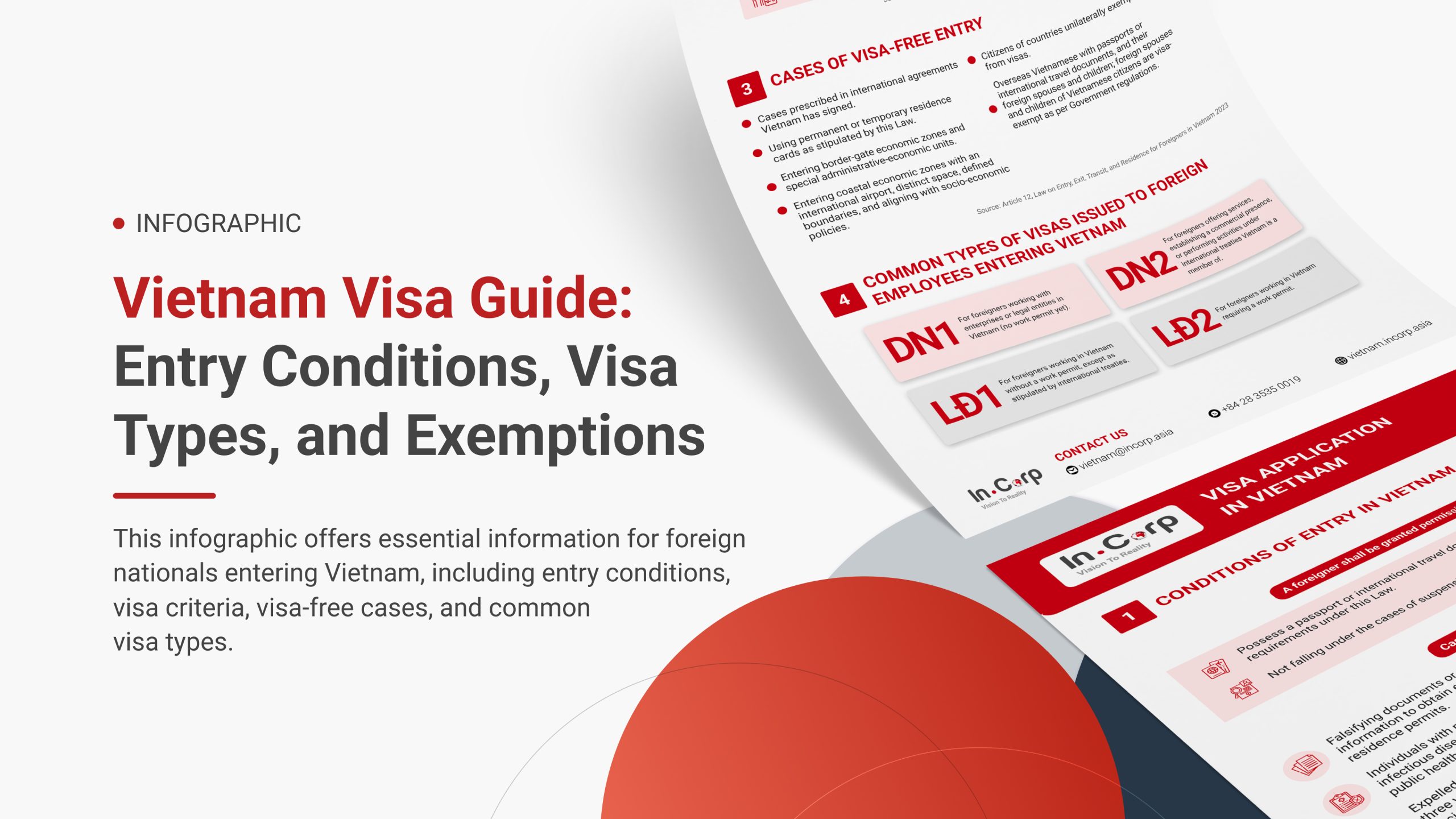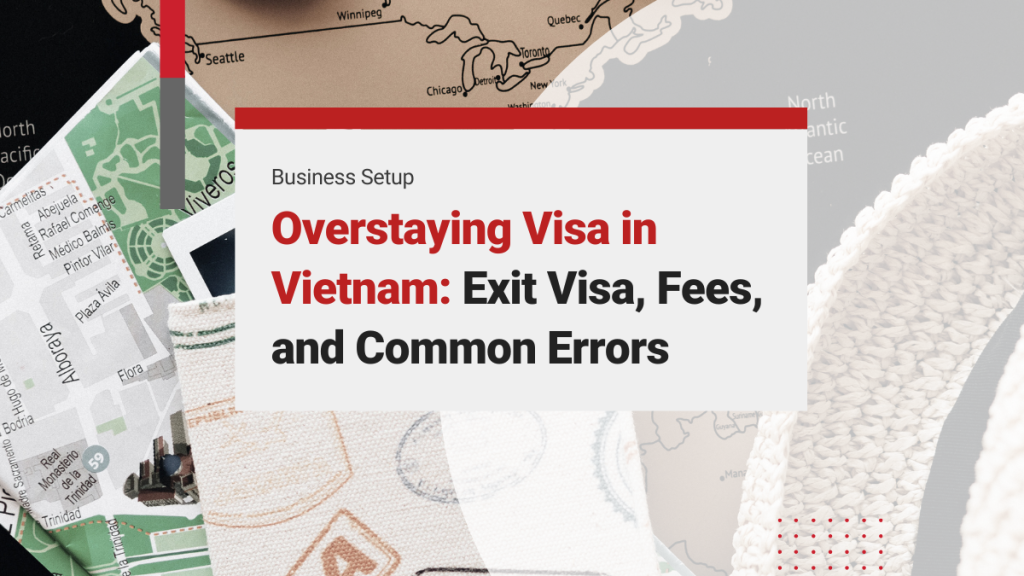Overstaying a visa in Vietnam can cause major complications for both travelers and entrepreneurs exploring the country’s business landscape. Vietnam’s immigration laws are strict, and overstaying any visa—whether tourist, business, or work-related—can lead to significant travel-related problems such as fines, deportation, and blacklisting.
All Vietnam visas have a fixed validity, which varies by citizenship, but the rules for overstaying are consistent. If your visa expires while you’re in Vietnam, you’ll be subject to overstay charges and must either extend or apply for a new visa. These penalties can be severe, including deportation or even a permanent ban from re-entering the country.
Check out InCorp Vietnam’s Immigration Services now!
To address overstays, the government has introduced an exit visa to help foreigners legally leave the country. In this article, we explore the consequences of overstaying a visa in Vietnam, from fines to legal repercussions, and how to manage these situations effectively with support from consultancies.
Latest and Important 2025 Visa Policy Updates
Vietnam’s economy continues attracting foreign talent and capital in 2025, with foreign investment reaching nearly $18.4 billion in the first five months—a 51% increase year-on-year. As of April 2024, Vietnam’s population exceeded 101 million people, creating a robust domestic market for investors and expats.
Key 2025 visa policy changes:
- Golden Visa Proposal: Vietnam’s Tourism Advisory Board has proposed three new long-term visa categories specifically designed for investors and skilled professionals: a 5-10 year Golden Visa with renewal options, a 10-year Investor Visa with permanent residency pathway after five years, and a 5-year Talent Visa with streamlined renewal for highly skilled professionals.
- Investor Visa Categories: Extension of 45-day visa exemption for 12 countries (Germany, France, Italy, Spain, UK, Russia, Japan, South Korea, Denmark, Sweden, Norway, Finland) until March 14, 2028. Current investor visa (DT) categories remain in effect, ranging from DT4 (minimum VND 3 billion/$120,000 investment, 1-year validity) to DT1 (VND 100+ billion/$4+ million investment, 5-year validity). DT1-DT3 visa holders can apply for Temporary Residence Cards (TRC) valid for up to 10 years and sponsor family members for TT-type visas
- Work Permit Updates: Foreign workers in Vietnam must obtain work permits valid for up to 2 years with one possible extension, requiring bachelor’s degree plus 3 years experience or 5 years relevant experience. Processing for work permit extensions now takes 5-7 working days when complete documentation is provided.
- Expat Residency Statistics: As of 2025, approximately 100,000 foreigners have established long-term residency in Vietnam, with most concentrated in Ho Chi Minh City (9.5 million population) and Hanoi (8.7 million population). Vietnam’s labor force reached 53 million people in 2024, with 28.3% holding training certificates – creating significant opportunities for skilled expats.
- TRC Benefits for Expats: Temporary Residence Card holders can purchase apartments in Vietnam, avoid frequent visa extensions, and maintain continuous residence for 2-5 years depending on their qualification category. Family members of TRC holders can apply for similar cards under the same terms and conditions
Confused About Visa Types in Vietnam
The Vietnamese visa comprises several categories – tourist (DL), business (DN), work (LD), study (DH), family visit (TT), investment (DT), and personal purpose (VR) – making it hard for many foreigners to determine which one fits their agenda. Tourists and business travelers often get confused between 1-month and 3-month single-entry visas, as well as between single- and multiple-entry visas. Since August 15, 2023, Vietnam’s e-visa program allows stays of up to 90 days for both single and multiple entries.
Read More: Guide to Vietnam Visas: Types, Application Procedures and Cost for Foreign Investors
Since March 15, 2025, Vietnam has implemented a 45-day visa exemption for citizens of 12 countries—including Germany, France, Italy, Spain, the United Kingdom, Russia, Japan, South Korea, Denmark, Sweden, Norway, and Finland—valid through March 14, 2028. An additional visa-free entry programme for Poland, the Czech Republic, and Switzerland runs until December 31, 2025
Foreigners arriving in the country by air can opt for visa-on-arrival (VOA), which is not available to other types of travelers like those taking the sea route. People traveling by any means other than flights should apply for a visa at the Consulate or the Vietnam Embassy in their country.
The Vietnamese visa requirements are quite complex and differ from country to country. However, there is an exemption list providing all the information regarding the countries that have free visas. Foreigners need to check this exemption list available in Vietnam to understand if they are required to apply for a visa or not. In case your country is not on the list and you forget to apply for a visa, you will not be allowed to enter Vietnam.
Other than these issues, you should also check for the following common mistakes in your Vietnam visa application.
- Details given in the passport and the visa application do not match.
- Confusion regarding the arrival date: you are only allowed to enter Vietnam on the date specified in your visa.
- Be sure about your visa extensions.
- Not checking all the information given in the approval letter
- Not confirming visa status given in the receipt
- Being unaware of the validity of your visa and overstaying a visa in Vietnam
- Forgetting to extend your visa.

Read Related: Vietnam Immigration Blacklist: How Does It Affect Foreigners Traveling to Vietnam?
Consequences of Overstaying Visa Vietnam
Overstaying a visa in Vietnam means remaining beyond your permitted stay, resulting in an expired visa. Foreigners who overstay often face harsh consequences like fines, blacklisting, and deportation. In 2024, authorities identified approximately 15,000 illegal overstayers, highlighting enforcement efforts.
Blacklisting typically lasts 1–3 years, during which the individual is prohibited from re-entering Vietnam. In extreme cases, overstayers can face imprisonment.
The overstaying visa penalties depend on the circumstances or reasons for overstaying, along with the type of visa. As per Vietnamese immigration law, the Vietnam visa overstay charge can range from VND 500,000 to VND 40,000,000 based on the number of days the concerned person has overstayed. Moreover, the immigration department can also blacklist you and deport you forcefully if you overstay in Vietnam. The blacklisting period usually lasts 1-3 years, during which the blacklisted person is not allowed to visit Vietnam again for overstaying a visa.
In certain extreme cases, the legal consequences of overstaying a visa can lead to imprisonment. Hence, it is crucial for entrepreneurs and other visitors traveling to Vietnam to be cautious about their visa validity and immediately apply for an exit visa if they have accidentally overstayed.
Vietnam Visa Overstay Charge: How Much Fine Do You Have to Pay?
As per Article 8 of Circular No. 144/2021/NĐ-CP, the Vietnam visa overstay charge is divided into the following slabs based on the number of days overstayed.

If you are overstaying for one year or 365 days, then you risk deportation along with the prohibition of not entering Vietnam in the future. Such individuals also have to pay an overstaying fine of VND 16,000,000 (US$700) or more.
Recommendations for Your Overstaying Visa in Vietnam
Foreigners who overstay by only a few days may provide an honest declaration and valid reason to the immigration officer. Business visa holders should contact a reputable agency for sponsorship and extension options, as scope is limited.
The most popular recommendation when it comes to visa overstaying is to pay the fine to an immigration officer when you exit Vietnam. However, this is only applicable when you have overstayed for a day or two, and the fine is VND 500,000 (US$25).
But paying the fine to the immigration officer at the time of leaving the country is not the ideal way to settle it, as your passport gets marked for overstaying. This can lead to potential problems when you try to visit Vietnam again.
Moreover, if you want to stay in Vietnam and do not want it to be marked as an overstay, you have to apply for a visa extension at the nearest immigration office. Additionally, you can also take the help of travel consultancies. However, it is crucial to remember that there is a processing fee for this extension.
Furthermore, foreigners should keep in mind the visa extension period and leave Vietnam before the visa expires again. Repeated overstaying can lead to serious consequences like deportation and blacklisting.
Final Note on Overstaying Visas
If you have already overstayed your visa, then follow the steps given in this article to apply for an exit visa in Vietnam immediately. For the latest regulations and procedures, consult the Vietnam Immigration Department’s official website: xuatnhapcanh.gov.vn
Although we do not assist in single-entry visa applications or extensions, we are here to help you with business visa or investor visa applications. We can do this through product registration services, secretarial services, or company registration service requests.
Download the full PDF guide for the Vietnam Visa Guide now!


clients worldwide

professional staff

incorporated entities in 10 years

compliance transactions yearly






